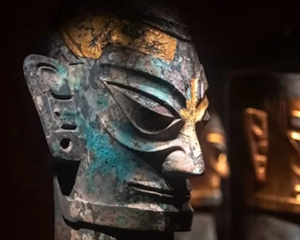According to the press conference at the Sanxingdui Museum this morning, as of May 2022, field excavation of pits numbered K3, K4, K5 and K6 have been completed.
据今天上午在三星堆博物馆召开的新闻发布会透露,截至2022年5月,编号为K3、K4、K5和K6的几座祭祀坑已完成野外发掘。
Cleanup work is now underway in the pits K3 through 6, while extraction work continues in pits K7 and K8.
目前,K3至K6祭祀坑的清理工作正在进行,而K7和K8祭祀坑的文物提取工作仍在继续。
Nearly 13,000 pieces were unearthed from the six pits, including 3,155 relatively complete pieces of bronze ware, gold and jade.
6座祭祀坑共出土文物近1.3万件,其中相对完整的青铜器、金器、玉器共3155件。
There are also pieces of ancient stoneware, pottery and ivory.
此外还有一些古代石器、陶器和象牙制品。
Since June 11, archaeologists have been focusing on a bronze altar found in the No.8 pit.
自6月11日以来,考古学家们一直关注在8号祭祀坑中发现的一座青铜神坛。

The remains of the altar stand about one meter in height, with the upper part being a bronze mythical creature and the lower part a bronze base with carved patterns.
该神坛残高约1米,上半部分是一个青铜神兽,下半部分则是一个有纹饰的青铜台基。
Artifacts found in the No.7 pit are mainly small and exquisite jade pieces, such as tablets and chisels, as well as some small-sized bronze objects.
7号祭祀坑出土的器物主要是一些小而精致的玉器,如玉牌、玉凿等,以及一些小型青铜器。
Some of these pieces were too thin to be unearthed, so the work in the No.7 pit is expected to last until September.
其中一些玉器太小而无法出土,因此7号坑的工作预计将持续到9月。
According to the archaeologists, most of the ancient artifacts found in Sanxingdui Ruins site this time dated back to the end of Shang dynasty, 3,000 to 3,200 years ago.
考古学家称,这次在三星堆遗址发现的大部分古代文物可以追溯到商末时期,距今有3000到3200年的历史。
The Sanxingdui Ruins shed light on the ancient Shu civilization and cultural origins of the Chinese nation,
三星堆遗址阐释了古蜀文明和中华民族的文化起源,
and are regarded as one of the most significant sites of ancient remains found in the 20th century.
被认为是20世纪发现的最重要的古代遗迹之一。













